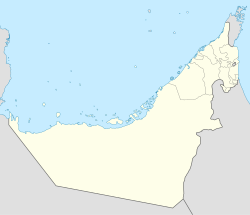Al Khari | |
|---|---|
| Coordinates: 25°5′47″N56°1′35″E / 25.09639°N 56.02639°E | |
| Country | United Arab Emirates |
| Emirate | Ras Al Khaimah |
| Elevation | 282 m (928 ft) |
Al Khari is the name of a village near Shawkah, in Ras Al Khaimah, in the United Arab Emirates (UAE). [1] It sits at the head of the Wadi Shawkah. [2]

